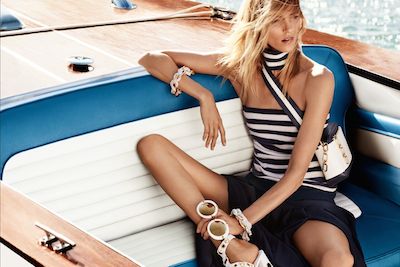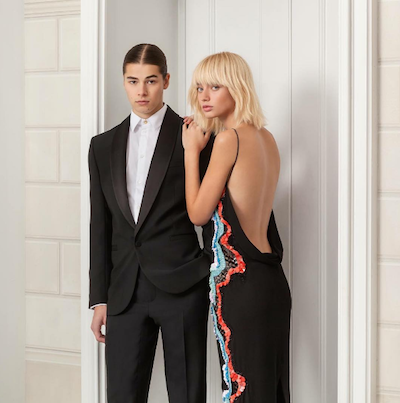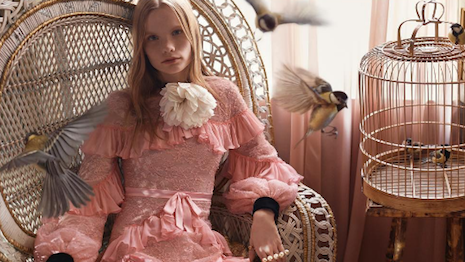While luxury lifestyle brands are not seeing any setbacks from their lack of empathizing with younger millennials right now, it will not be long before these brands start to see effects as the group ages.
According to a new study from Hitwise, brands such as Michael Kors and Ralph Lauren are having trouble identifying with younger consumers, aged 18 to 24, but are not showing concern in this area. However, Gucci is significantly above the pack in attracting millennial consumers, which can poise the brand for long-term success.
“Eminent luxury brands such as Michael Kors, Ralph Lauren or Coach are failing to attract the youngest consumers, but this has not caught up with them quite yet,” said Rochelle Bailis, director of content at Hitwise. “Their share of 18 to 24 year olds may be relatively small, but their market share still looms large within the luxury industry.
“This is because today, most young millennials remain aspirational luxury buyers,” she said. “However in five or 10 years, the young people that dream of Versace dresses and Tom Ford suits will be the next generation luxury goods consumers.
“These more edgy, celebrity-laden and Instagram-savvy luxury brands will reap the rewards from planting the seed with young aspirational buyers."
Brands and millennials
Michael Kors and Ralph Lauren may have a hard time connecting with younger millennials, but currently these brands top the most searched luxury brands list. Adding in Coach, these brands make up 63.5 percent of online visits within the luxury apparel sector.

Michael Kors campaign
Gucci, however, has more than 50 percent of millennial visit share, which could be due to the brand always maintaining a youthful, edgy image. The label uses tools such as Instagram exclusives with models and embraces styles such as “granny-chic” florals and androgyny-forward styles.
The fashion brand’s largest audience segment is 18 to 24 year olds at 31 percent likely to purchase, followed closely by 25 to 34 year olds at 27 percent. Although during the holiday season, for reasons unknown, Gucci had trouble maintaining its popularity with millennials.
Versace recently saw a jump in millennial customers during the summer. While the brand was seeing this increase in overall market share, popular supermodels Karlie Kloss and Gigi Hadid became the faces of the brand for fall, as well another campaign with musician Zayn Malik who is romantically associated with Ms. Hadid.
Millennials aged 25 to 34 make up the largest segment of Versace’s audience.

Versace holiday campaign
The majority of Michael Kors’ audience is also ages 25 to 34, but the brand sees negative 22 percent on the likely age index for millennials 18 to 24.
Millennial insight
While some themes regarding luxury goods are important to all age demographics, there are many that vary from generation to generation, making it important for brands to adjust their messaging.
Another report from Shullman Research Center shows that millennials make up half of adults who have purchased luxury items within the past year. Within the survey, words such as money, rich, best and classy made the top of the list for themes important to them when buying luxury goods (see more).
Luxury retailers and brands should be leveraging chatbots to better combat the disconnect in conversion rates for selling online high-end products.
A survey from Retale has revealed that more than 70 percent of consumers are interested in connecting with a branded chatbot. Consumers are interested in experiences that make their lives easier or offer some sort of value in return, and chatbots can accomplish this (see more).
“Most people would be surprised to discover that Michael Kors, the brand which captures nearly a quarter of the entire luxury market itself, is struggling so much to reach younger consumers,” Hitwise's Ms. Bailis said. “Michael Kors is a young brand, it has only been around since the 1980s, and yet 18 to 24 year olds are less likely to engage with Michael Kors than 65 plus senior citizens are.
“Meanwhile brands such as Gucci have been around for almost a century but manage to remain relevant with younger consumers by pushing the boundaries of experimental, unapologetic fashion and modern marketing,” she said.
{"ct":"gQLtRRNSpMmNzUrkwqOj7k3eoSUjQGuJxE4s58OxGVwArl0XubH031GHXa73tsUDATyK9Sy1BkzNPq1e\/CHnO\/12V\/FS5kwHJEJEYRzr2MW0LrW4LGcjO5D7MQpmBt8gU2qJqT8eaBxkmk77abkctjPTU+RyWMi9gpYN2p3eK6BJV9viIkAvdbyCJb5mQQpR6RNwS07pKHG3VaN2gwQ2t1Qq47cZ0\/tNGQ4YhrN3DviY9fRodNsoJOtauC8jGeWjFtSxVzVOw01SV9gFVMEjdgnqqd\/lN7RANzW+J920\/eswdROcwUU8shg3GC73dWRsvuSqnXj+fPvIghT+lEzjSMPL6RTvlmuJTDEIB3gmoo6sr8bM1vxlYf+V532Z4RVU72R0DGBvODGpxV15Z3xB6ISQUfMnWR7V9MYPOKY+QbFiDW9lcr8zI004UztndUYPr7X+u46m8IO0DuQ66Bk7Le6Xf05QThajA2SeglwHDfRlu6nuAdBkfFzCqdlYG6cpLCOKzWFr36Bppe6zXE0N43lTzI7+nrR\/8i4latv7qzaUjFpYSNuk7lAiFQnLJNAiZF\/UKeSLhbRfKL8pjDbhU2iTLrptog8aNimQklRWn+TamEK5msDzikZaHG54wjgaoWVNL7ojCFWaSCEi\/vbkkglRCYoy6GJdotItW8\/zh7Geu5+wCttXeOV9QElsOEwXmLsmsa5SwAmca+taZ8p5YgDQOwb4+oXdIgifIX2WHewnk96R31CUv4N6ML0zClyoBjHpWDaocD69+9sm5hWwK9t9UyNva7s8zbLzCZWyesco4JIB+rJhHBz7r9ba9HX\/fEtXgv5lATG6icevCZogEKc3juGPNaoL8ItZ6HxcZEdLea6GGUgU9qje3M0FPWi5tcx\/Zz3k1BszsLt4qnLwl10HZDtOYns4H\/bWtY8Oa77\/xiPyCmIIc3X+O7AbmR9ENSMtqb9bYwsgEslCNsP+oopm+mQWIXRm39yuKa1gWY+TVL2sADBbInecJ0j3E5N047QfdqgUwir4Tc\/+4EZc7d3g0EKUsfQ5yDXsFh9kdB8MSv9jawa4bUOG2tMOyIDbSAxeHGjDDUk7Zr1btk91OiTI37pdMcFhMCtacAGyIPdvuqtJAEn1HO2EuU2uUaWwUwXdG+cbh7nBH7EtpihMgDP9jHdGKnOBcTzeWVNjh4oad+EHS6JKZj3l4K132i6OneVEzeEnQXQ4yJjZXap4GJ1q8qokhIleqJKR\/1e6bQIYn5P5PbEyNaYp0B\/JVtEbCv+jN8AQniaSQ91LO8dHvfJj71WPkCqnTANhMuYrkDpAtg2J1s5tc7zoU6C8CKvme2o764OS\/PVzwqJ\/laU8OjXa8kg70Y2d592mLdOGqEWnbLXlLLCocLZpFqR+1rHLLquxoziEsfMYGr2J9sKDRpo5GSxTuwe3L1\/6bwh32iEdpOirFyfVDoBVTXa1hNnATjGiTipAfeh78YPfJjv2Pvo6VaFov4p9lgrOzSX9eM1HdBGUG8mH\/nsnIFS7+VVEsQN2fgw2k2+5OWBBRWH0ghnZtr8duaUjeoaqDFxWHIEnNY8vJvPLQ+ntpDUdYwJIX6Np4SUPSUj8+p3f+dIZNj8CbW2fZyX+YBVnfIGB+7OTk+Tq\/eCQcTVGhwcgFFh0B4zqOACDrJXPrt\/s+BjY5huslWeB3gaXfdcpdFUTI22EhELVQ8S1SAzFYUbJXqNs2AnTkpKCygRiCGAeiVinY8w1IYUThVXMZg4LFBD9tgKC5Kpe3JlI\/Lb3kVU0YMe9LINrjx\/Jigajc\/tkj5i8Kpqm8u5cOwro5q3yBtq9gY6cqg8elwESx9DBPe\/agNwdCdtVwqvkUjEg49ww57dOIKUyKe0T0Qrv5h7qNYNYOAuijx+4rIFTtex8DXCOC8OMybiXUYDdmW+q8gOcYqLXwJO6scdaq+6BNKOtFrQieZN9EEAKL8rk8O\/6HRolqtSNvk2Nr+R89tQdbimxg3y8CSnx3xsvg8ZTZnzvOje6qOTS4y6W0nEovPdQveN2OU4tsqlRJ1Xjg3DUIoU+zZ0\/fZe8jyhlB5vX+mtG133qgeLhA8EXCAG71U6PgV0nBURE4o+OodSEO4vU333b5ItyU7NwFacuPklBi14OYF0gxinxjBqPh\/vdZPeOm4MUuADKC3VHsr8Uea+yZLt76S7\/kq4hUnoCSDMAaUrYdri1OCULnk9yFmYATwEGDJkZMT0s4+ouHHTXEkn3ERPp3YJuKqI7iPcJop+JXiREI4A2pWk8RJnccxDZbY4eiNKM61FFSNxzlnVkVjeJIn3dJaAo6X9N7plDoFtYkApTp+8oScfItzhtmERMlmWktScByOIaxsq07DG\/EeDBCDapF7NEbtNyIGn+hlNMX4ShO+nd6\/sZeAHCqWnQxEUkMzPIGiWy8DjAoUMRtBdaKaD6YtYKyzAAz\/Ru2whoIDV29YMDBRWDcfrBq7EyxwV2jMeVzFV0Fqy6EZgVl1ULCRNIN3+dm\/LGNt2BlcznNMm+OBbyXrl21ANOVOo3nKj+SRR9JXLeVu\/MlrHNQoy2RaWFx+YLDJGjSU8I\/9EXDIjvEZoouURYPq1vMBagMWidU8qdcWhNZ\/6iuTl7sgvzujnDGfOirLaefMmK8ubVzte5kavLndkshBpNF7KKU\/NeNV\/8Fmg8bDLkonVDtqWkSrOhOGxWNw8s3UesgAnvo6QItETkLuWW5cEhoDGCnck83vHS6n8cCCjXYSuXMfKEUv9TRyjcXLMpx\/El7Q8HJJzP1UvSMwouYRnbMXJxshss9lGGOR4ZcL1mcElSPSPpwOdz9EhaMtqDqA2BQ24nvkaD5WtEgj\/OwSqRYEeDcIzblsvQ6jINBvw9kCuzD7iIREvbpqhRXQTnIErXQuUxqjrZxpNpJHT\/WdNYtCMRrjaxwVIAECH7H7XwhoUHMCkfuzmvFRumVJJMWVADQPfL\/QPU6khXIdFQo3ywh9IDh7ldo\/Ao6zbtMX6hU5IcbmcSWulC4EfDprbQ9fmzjd8\/TcDPbWouTE\/1KfeJxqf9Mtjxb9jNQ9km2PMfdT2EJOIdTwhCKvFwDkmjcEj0r4VC9\/aVFbAI\/XKUHGP1SEKaoqCunKOtitfF+aKsHV04AJed4+SfY42xpEyvuLZUNHzXGHxJ1BZzw93lj+mifspnMSTKYRDIi99b8RMyxmklplPxboRT7g\/JK8rAnCx1Fie1W\/e9QC44nW6WMvhe1X+i3r3ifLne1ozZ0drJZbLVbQnprC0ikx+MK7BMZFRWu0Wv57Cdm8hPTE9asiew6kX9XPWuINt\/WFwMxMfsyKHlmwV9VCUvnBdKoKWS2IcGswP6JFxxuI2Th4LPQj5V5tIzqzEV2yhf+sOeOEY\/s6dA7uoKyXgAPPiKdTO6gidi095M9kNNjPKk8IS3Ik039PLGzzfJ0goDuhVndlIoNx0TrezfuoK3gzRB1cuQc\/xDB7SMEGg2\/hY7jkIHw9Nl6uZuMw2sphuGeN\/QC6\/IoftS1pkKO3gD7iCD057ugTBXuSA+PKK0OX58tcphnd+C3jymmJoCeqw9eSbFhWa5dwL1sLhS0xisKI6snBvrLdDw9UIhAbFVS4agDdzxazuprMV3sELe2DgtAI8ygJ8mBU2dWNVMQ6UrzrJGKhNkwAL8X6nNikZT7xd6XKZ1NyTyyVoXTOrTld7j7our\/LNXHtvpCYiZ98L1SAMD3GvW4vCiHjY53QeNlcGUEYG10wUAM5c\/B4ybc+CWgKa93ctq13\/RVVdlqlfb0228yohTLGhhV5ZexSge7S4wZSQrgxeUzXaYtZRsd6UBzDGPUaMPLLPoOqy8uarMTWTlRlm20zhNuMlphoTmsyj5kntaeuf6AfkD+mk+TFZaCqtrfvs8MN6GMo7vX13pTK2MYVLOLoCXNgmxT8kAn2O8q7hbMplGSdoidz+7Djqqne8+od\/X4w42vLF1\/P1NxNbtRHTPEKH4\/js8s\/S3HwvtWwc+g7Z7XsjqC3Kb+l32GfEr3BR+UPuqGAXBbvVis9YcWRNV28iG9YRsKmoyNQlWplXUzdIEIWsBUZfncr5A7Hsq106fXZNcnm0fy5d9J5uQ4Yua\/wXVT\/q0C1bROLTEgps2JjNdjXFy47\/UhnsvIWx94XZED+lVWbhG3CnT5mQLOoKGHGUvxHn6S\/scEoK5tTmukmXsIo923kghzbVIeL\/n0nxhLl1YbcbZLCUE5JDXP9FSU2Qgjz45z64ddBHbmLJ6pc1CPLAZiOPLhvocV+8DhaPa7fwheu4Jp71ur5recNuqCZzhMHRfEwha\/OLvz+dscszhAUVGp9vOzyMJZOzSOecYxurra3+e+KsR6FKdiLs5l9kCnP0kA8+XVs3BS31pywWqIagf8Zz6mG+voEOnxFiUjI\/ihEgWUIC+HiwLIhufdd6giFU1B60X66ouirbSn5HEJmCI0I17c9WdZi2WREQPIn053Y2n2Y\/aJVD5KB35oraZThrTSzZoZF14gwMeDaeuSU6rnpOEPd3sRiWLCD4B8lBcb0+1LoaO8hz6kyz5xYH3SBNqd0fqJz3tLeZRp0JyzSLgVfVoaYC1gK8ewt8Gw1wOX5ZUiazDgGoggOfb0H4DvwWnPV6+WmS2C7o7KLbhiz\/O2uvmXiIi9pXlipsyzkOx\/xWwRF6CIWqPbHFMxe8HiBX4a0O21LX9f9wtDux\/YvipsgqYFJ1\/djyKTwyaKQQdHBLBlv1TSYjF1HchZqpAETkGtsY5dpIRK\/y8DeuauHHNaTf49TIW16128V381cbGqLV3I2x9uR3BujS+wbvY+mxO7jUO1Tdqb5j\/08\/CT9pvM\/f\/CIUVPFiKJW5QEbfM6w9IwtHx1ww4Hv1fe8dBOYEXqiKT175xvLU9Pg1QqHDQzeDwDFTgah8Q4OxvhAh\/LUyBc\/iEBs4sRGG3DffQIK3rLl7nOEL1lR2\/AfUArGfgqBMsk698lEhnvKKQmTCV2WgzvJayuV70+QONud16ByWZrBHi5D\/wSs5pcA+\/8uxnrAP0GMnM3z7SUPSSmWEYNRGBMRyTFH7qdWAgrYzBpaL9oWEInYzh+cNEJk3frKD+5JACEEhM\/50SMNpGc9RdDcKBIEpz06MnpR68elM4+uSPNVFsu3FAOUZbK1wuM7FpZWzL\/qdOfWEWGp0vnNSCg3iDH7++kObUezgrD086JjFBIEhiTZ3woZzM3YLv0U7foQUKmuc5FEsz8HrmGLTN76k5nSwSQy4pIKcFys4gTb7bkimYN+U9Z7CpnpTZviyJ1yQjE\/oTnxCLCjm4ykuGWNss9a7yKTwmppeoFBTBilNRdyUWVTmjwsLGT08GMIojWdOJ883bLg2DruhmXcfdcN\/YVVMrWruSZUNZ73svUgo8qkQvkLjySAynAazvNS4jpsovtxlwhVIKstASpyGCP0AOkldoKTphl0wUsoFA3M94err0O2NGdvUoG+pMTdo91oRv6k4oe2tDqx\/g1kQ9yByPgNh1waFWGDT5I+rocIgjzg2Pp\/\/whOuGEEiYCdcOyt1bnp9v3KvPiBShBnGAWqa4pI1j5OAqqPYffrmgZpUX1FJBgRPz9Bh3eX3AHc7bulvdayU8jk9XZoT92liGF4Xnw\/yPjwXD0fqovhD6rGCNxIs9YFJYSgiHDDlHFY7B7zAtlV2DUO\/OAbFcsvB0MLnTAXbc0A2Ite\/37w0YDSVJ5Ju2brDjOrK1D\/VvjSs3bfCB95WIvp4UCOg3zWvzQxrhzZQloC2qzYYC82Gce5BcEd9W52O5Rre3R+OfvNqNFL++pn62xFrSOt\/95bXprKMerm2satNfF+EYUhopgynpeaHzafjcAAfx8YLVXj9E8F2iryuLdFaGO1whsYywsfTJQMblk5sOGevKqgSy0RmnAettqOW6HCXUzPnwjpMIv5e1c\/kRMPIwg53BK5rgUeE88v5NZHzE18jlqNwKxxGwWdCGwGc455ayWp9qzjzKfE0mOrvqf6HiwhkokW1XTKqJTykrWsIKnXRiueuYIRS8fUoJvZmPp3A5Vr+hxq7KfboTtAqiy7oGjzHfECzuP\/VDjCEAKgQWY\/KkgmSvk\/BZ4TZtsdKFxupYdlR3pr6ZzZ39hW\/Qkqw7cFVybipmMVp+ypgbWYe9PZ3wJEWOB2pN920ALVO2q0V\/\/PvgeQk7pWnGObxaWYNxALvNcPXg\/DjmKPkYVN+FpitkeTJSeaY47W8xkGw1R2NDyfrekShMha597t8Rzkb4jKGTgbAO9eroLFAwY3m+V2XS+IKHW\/bjjABqsfmAfdpS1dn4ocQ\/llHLRo3Kw2Mn5ynISN6SvuZDS4GuMzPF5ly6x\/eT9ErM8+RCw\/kyP7Bj39ZK8Hg7rCv+6D2tPYJM1KkkP+ZLktR\/sMo9WlCMI4ZyiLAELaOauu13hrWO77JUyovo4mmBhVyr8kUGcRdGBFb26xrbVc5cBglRd0XlnBq6oPtX8md00\/SLiLbZ0Cbt+Z99tMiHVIh5sVPEDg5MEZ7Xf\/nYlCDsFE0tFhmBIY9hnWhnfs+rhBkN9ZHivJp+G0dyIMwnS1OGO1ZR\/e678TYpp9qnTQBjDat\/yxTD0P6lbHk142\/3UEUgEeq3hyeepy4TZgKHbaQbTTUXqdIlXGTMy2Z7AW5YHyhm\/SargDYzh0eWhfURvMafya9XImMkU10CyrzKmZE3d4QZvk6FOOJ7BNrH\/zZb0ctXiYDQx6xp9hce29pk3d0iXz\/JQHTj8ePxZIrr+JJh7pZwayr4KbjI10GTei7MeOJ4KLs+aTcKVdwb1\/TxoatI7rzTDpz1w413qSqqLsNaaw5XJ4VXtLFakCi5FQyfYyj3PCpNzv+21GO+CQ6VD+CsA2ua2oz0pi4AEeeW\/ISgE\/jcZguYG3hG5ea2IJFZXEecbFViVI6NvFT6ZTlyp+MDAQ5DrHQuG5ZPFfhpWy5RscBTMgHTxSTqXbl8Z5TgVaLRYtb2gHIncLAWifppYw7J4F3qRbSWLhIPDQaa7U0KiD2VweIIvBo3ImeEnNUrE94UoAAfUcjQhlz2Yt82zFpyECowyH2TwIxH\/qs1MfnZlpm+v+g5xqnaTkxRoTbunrjMioZgYbjxsN6s4hJDO71Bt3LXIfbNSBVv2F9P0plwdNz78B\/kqL0EyFrlPPGqBCC+4pUOva43z3KpXAAvpcoDMzrSL2+WCtwIttZLki5GvBDaYXFfF4xQ22f+VkkiGNF+Mm6vZy7XmOok\/GEkUR8KM\/vP1f78Y1Sp253ZOdn2sP39aHOV\/keoTmPmyN1bMWZ6thynVYmuwO5G\/YR7xI11FCz1Bd9FPnBMR3h6MywxpF0qDbQkS0gh1qjNbERy5nQD6YFfyr224E2qOIyBVZprTT3yJi8S13iKhO3Dxa+191QKlE5trYhjEvBGIXZZdGLWkHRn86nxLvlrkQWsjiFk0Z+GryvbPGGnvpCN97bWnaER0ZtMgT23kR2tFmwp5SRgsBDvxg==","iv":"c6f3b80c208e264f960958c4d192b19d","s":"09071cc8aac81c1a"}

 Image from Gucci's Bamboo campaign
Image from Gucci's Bamboo campaign